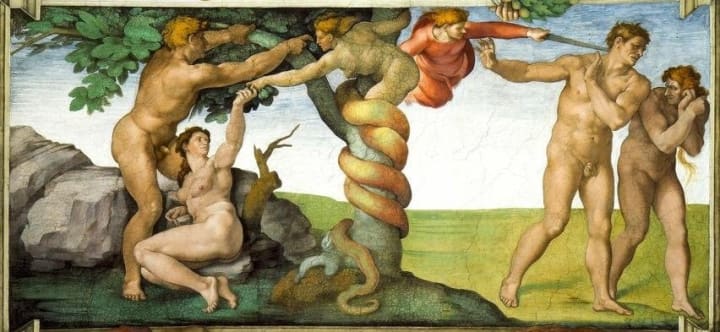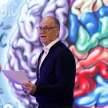The Pleasure Principle
How Pleasure Teaches Us.

How pleasure teaches us.
In 1986 Meryl Streep won the Oscar for Best Actress for her role in Out Of Africa. A stunningly beautiful film that won several additional Oscars and told the true story of Karen Blixen, a Danish Baroness who has a passionate love affair with Denys, played by Robert Redford, whilst living in Kenya.

In 1988, Babette's Feast won the Oscar for best foreign-language film. Babette's Feast was based on a short story by a writer called Isak Dinesen in 1958. Isak Dinesen was the pen name of Karen Blixen.
Both films are about pleasure and its relationship to beauty, austerity and pain. I believe that the pursuit of pleasure and pain avoidance (even though I know some people see pain as a pleasure) is a fundamental human drive that pushes us to acquire new, novel experiences and information. I also believe that it has a strong evolutionary imperative and is one of the main reasons humans have engaged more creatively than any other creature and have populated and dominated every corner of the globe.
Babette's Feast is the story of two spinster sisters who live in a small religious community that lives in total austerity; they have renounced all worldly pleasure. The film and everyone in it are very grey. A French refugee from the Franco-Prussian war, Babette, arrives and becomes a servant to the sisters.
After many years Babette receives a letter that informs her that she has won a French lottery. So she pleads with the sisters to allow her to prepare a meal, a full-on French gastronomic feast, the likes of which the small community has never experienced.
The film explores physical, mental and spiritual pleasure against the background of absolute austerity and how pleasure, in this case, gastronomic pleasure, enriches lives.

Pleasure is imperative for human existence, and we are built to seek and satisfy pleasure. Pleasure and reward are at the root of many of our desires and motivations and are inextricably connected to how we learn and grow.
THE PURSUIT OF PLEASURE IS A SERIOUS BUSINESS.
As children, the pursuit of pleasure motivates much of our learning. When we delight a child with a story and ask for it to be read again and again, they are trying to feed the feeling they have by repeating the experience. The experience that has now become associated with pleasure.
When Proust's "In Search of Lost Time" bites into a small madeleine cake, he is transported via this sensory trigger to a childhood memory about his aunt; he is experiencing the pleasure of a memory that triggers an emotional tsunami.
But why do we seek pleasurable experiences, and what do they do for us?

Dopamine.
The main protagonist in the pursuit of pleasure is a neurotransmitter, Dopamine. Dopamine is the feel-good neurotransmitter that enables or inhibits synaptic connections in our brains and is associated with pleasure and reward. Dopamine is involved in the neurological and psychological functioning of mood, decision-making, movement, motor function and some psychiatric disorders. It is one of many chemical messengers that enables and disables specific connections and reactions between neurons in our brains. It is released even in anticipation of a reward.
Dopamine has been shown to contribute to mental states such as focus, awareness, motivation and the feeling of happiness. A flood of Dopamine in the brain will cause a temporary feeling of euphoria.
Recent research has shown that pleasure is activated by natural opioids in our brains which facilitate the release or the inhibition of Dopamine. Higher levels of Dopamine are released with anticipation and with reward. Lower Dopamine levels can cause mood depression, reduced awareness, difficulty focusing, less motivation and poor coordination. In more extreme cases, lower Dopamine levels are related to Parkinson's disease and other motor control problems.
Together with other neurotransmitters such as serotonin and adrenaline, Dopamine tells us that they want to be satisfied. The more we do something that satisfies a desire, the more it craves that something. Do it again, and again, and again.
Babette's gastronomy and Proust's Madeleine sent a surge of Dopamine to reinforce the craving and the desire to satisfy it in the future. The cycle fires up from anticipation to motivation, to rewards and then to reinforcement. If we don't get the reward, then the disappointment lowers dopamine levels and depresses our mood.
Dopamine levels rise with anticipation, pleasure and reward. If Proust were to only smell the baking Madeleine cakes or even see them, he would have released Dopamine, fired up the neuron connections in his brain that would have anticipated the cakes' pleasant experience the associated memories. Once we have established a strong pathway to a pleasurable experience, like water creates rivers that create deep valleys in the landscape, our neural pathways become superhighways to past experiences, memories and behaviour.

Semantic and Episodic memory.
Memories are not simple filing cabinets that contain every single memory. Memory is encoded in many different regions of the brain. As a result, memories are gathered from various brain areas that different house types of experiences, perceptions and sensations.
When the brain tries to interpret incoming information and "file" it, it releases endomorphins and increases the level of natural opioids that boost pleasant experiences.
These codings can be categorised into two types of memory.
· SEMANTIC MEMORY, WHICH DEALS WITH FACTS AND CONCEPTS
· EPISODIC MEMORY, WHICH DEALS WITH, AUTOBIOGRAPHICAL EXPERIENCES, TIME, PLACE AND EMOTIONS.
The more pleasant and exciting we find the knowledge, the easier it is to retrieve it. This leads us to assume that previous experiences with colour how we view new experiences and will depend on the order in which we receive information. The new patterns we form in our minds are framed by the patterns we have interpreted in the past. Yet, we crave novelty.
Imagine that you listen to a conversation for the first time and you find it interesting. If the conversation is repeated, unless there is new information that you had not noticed before, you will find it uninteresting and may become bored.
Pleasure, stimulation and enjoyment help to encode memories, as do vivid emotions and visualisations.
Tony Buzan, credited as inventing mind maps and various memory systems, points out that memory improves if we add visual information, association, novelty, and emotion.
On the one hand, we seek novelty, entertainment and pleasure; on the other, we strive to make things habitual and unconscious.

Novelty.
There is a strange anomaly between our desire for the novel and the new and our need to reduce energy consumption by committing our behaviour to automatic, subconscious systems like habits. We struggle to learn a new idea, which we want and need to grow creatively, yet we have sometimes have increased pleasure of repeated exposure where we should lose interest. This psychological phenomenon is called the "Mere Exposure Effect", where we prefer the familiar rather than the different or new.
While these two mental systems may seem to be opposed, they are two sides of the same coin. Once we begin to understand something, a new idea or concept. The moment we "Click" with understanding or comprehension, we release our endomorphins in the brain's association areas. These areas are responsible for making rich connections with existing, stored information.
Habituation and the decline in interest-only sets in after the associative activity sets in. This reduces the endomorphin release, which in turn reduces our desire and anticipation. When we reach mastery of a difficult or challenging subject, the payoff is the "click" of comprehension.
When we play video games, which I don't, there is a lot of repetition of mental and mechanical effort, which would typically signal disinterest. However, the anticipation and reward payoff is the increasing scores as you accumulate as you progress through the various levels.
We can feel impatient frustration when a computer is slow to load or perform a task. We want novelty and reward, and it's not arriving fast enough!

Habits.
Given the need for novelty, balanced by the need to conserve energy, we develop habits so that most of our behaviours won't need high energy consumption. Yet, there is an apparent connection between habit and addiction. Our pleasure-driven minds seek out experiences that stimulate us, and in some cases, the desire for repeated reward develops into addiction.
Habits serve us by being invisible. Pleasure serves us by assisting us in finding beneficial experiences. But sometimes, as with nicotine, alcohol and perhaps other drugs, the pleasure "hit" diminishes because our receptors become numb, so we seek out more and more.
Our brains respond to habits by turning down the amount of Dopamine it provides, so we need and want more to return to the pleasure level. When we over-activate our pleasure cycle, this affects the dopamine receptors, so we lose interest in other things. This can lead to compulsive behaviour, and you become less able to resist these substances and drugs.
Once addicted to using these drugs, even if you were on the wagon for a long time, any exposure to them may trigger the desire, and you might relapse.

Evolution.
The pursuit of pleasure is an evolutionary survival mechanism. We needed to find things that kept us safe, and the best way to do that was to find items and separate those that gave us pleasure and discard things that made us unhappy.
This doesn't mean that we only do things that make us happy; it can often depend on the types of goals you set yourself and the value you place on the pain you have to go through before you attain the goal.
However, we generally seek experiences that lead to a better state of existence or wellbeing; we are not self-destructive creatures. That often means doing unpleasant things in the short-term, but that serves a higher order of desire and attainment in the long-term. This encourages us to learn, to continue to learn and to plan and to be productive.
Perhaps evolutions boldest trick has been to give us a strong drive for pleasure. It's an evolutionary imperative that assists our survival and procreation.
I guess that's why sex and food are (normally) pleasurable.
https://www.charlesleon.uk






Comments
There are no comments for this story
Be the first to respond and start the conversation.